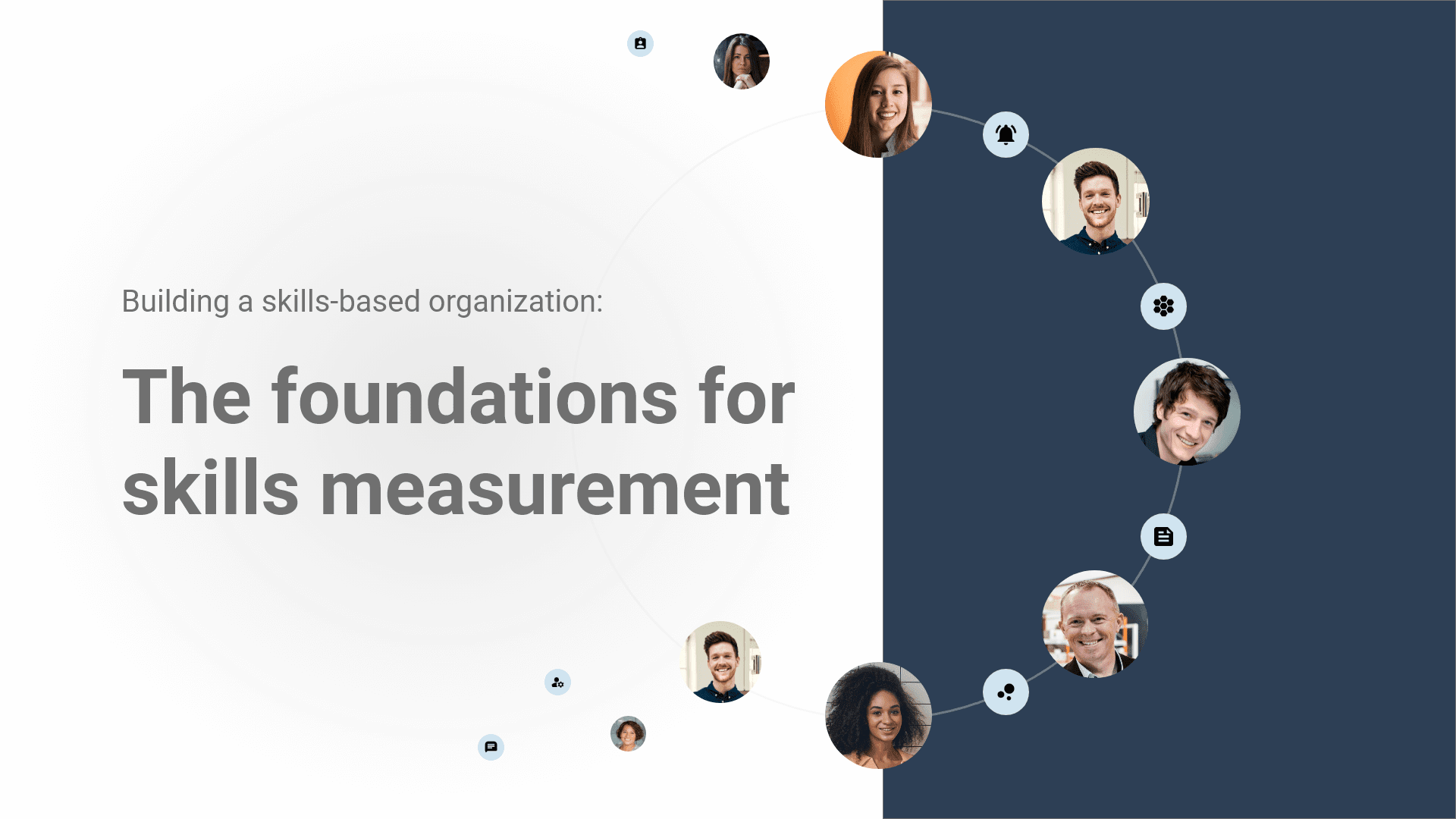Over the last year there has been a lot of discussion around what it means to be skills based. But, a missing piece of the puzzle are the fundamental steps necessary to get there.
A core part of becoming skills-based is to create a skills assessment framework – but this is not one-size-fits-all. Finding the right approach is the first step to a skills based organization. There are three broad skills assessment approaches that organizations generally consider:
An Inference Approach
An inference approach to skills tracking is based on the idea that information about staff skill levels exists within the organization (or abroad) and it is just a matter of finding, collecting, and processing it. This approach is generally appealing to organizations at first glance because a high level of automation can be employed in order to alleviate some manual work. Once skills are inferred they can be refined and validated by individuals.
However, what information does a machine realistically have to work with within the typical organization? In the absence of a prior well-executed skills management exercise, where can the source of reliable skills intelligence be found? As a rule of thumb, if a hypothetically best possible team of people, given unlimited time, could not discover skill insights from existing data in the organization, it is also not possible for Artificial Intelligence to do so since AI is only faster than humans, and not smarter (yet).
The proficiency of unique individuals in specific skills is not something that can be taken from a Job Description, since those documents are necessarily designed to represent groups of people. Identifying proficiency from resumes is also unreliable as there is no common set of rules and standards used in deciding the level of proficiency.
Resumes are also static documents (within the course of a person’s employment), so the longer a person remains in a job, the more out of date their resume becomes. This is true for any data that is not regularly updated. As such, an inference approach can fall victim to out of date information.
Ultimately, despite the appeal of the “hands-off” nature of an inference approach, there can be several drawbacks. A lack of a reliable skill insight data source, data with varying levels of accuracy, data currency uncertainty, and the possibility of bias.
An Organic Approach
The organic approach gathers skill insights directly from individuals. This approach is commonly used by social platforms since it provides the most flexibility for end-users. People can declare proficiency in any skill, in a generally unconstrained manner that allows them the ability to express their proficiencies as they desire. There are generally little to no rules in an organic approach.
An organic approach is perhaps the best way to overcome the obstacles of a social media platform, for example, where there are millions of people generally operating independently. As such there is also less reason to compare the skills of people on a level playing field, and so the fact that skill proficiencies don’t use a common method or structure is not as important.
However, this flexibility comes at a cost when employed within an organization. The lack of controls and structure means that it is not possible to rely on this data for making important business decisions. The lack of rules and standards means that it is not possible to compare the skills of people fairly, on a level playing field.
A Skills Framework Measurement Approach
A measurement approach is where an organization takes a data-driven approach to skill insights by employing a considered method for the measurement of skills.
The organization designs the parameters of how skills are to be measured up front, and ensures this is applied universally so as to ensure accuracy and fairness, and to decrease the influence of biases. The rules and guidelines of the approach are communicated to all stakeholders to ensure clarity and gain buy-in.
A measurement approach requires more up-front work than the alternatives, however, the organization may enjoy the rewards of that work for years into the future.
The Benefits of the Skills Framework Approach
A measurement approach provides several benefits to key stakeholder groups.
For Individuals
Measuring skills in a systematic way empowers individuals to take charge of their own careers, including providing clarity on their interest areas, orienting their thinking around skills, and providing an opportunity for self-reflection. It provides a clear and transparent framework that can be understood by anyone, and better helps individuals overcome their biases.
For Managers
Managers are able to gain confidence that their staff will be treated fairly and on a level playing field, and also increases confidence in the rigor of the data. It provides managers with higher quality data to inform decision making, and provides for more meaningful conversations with staff in activities such as performance reviews.
For Administrators
For those actively managing the skills data, this approach allows administrators to implement a skill data model that provides consistency across the organization. It ensures all data is compatible and facilitates the creation of flexible reporting across multiple cross-sections of the organization.
For The Organization
A measurement approach establishes a common language across the organization, and aligns expectations across stakeholder groups. It provides an organization-wide standard that removes doubt from the process and gives stakeholders the confidence that they need to make key organizational decisions. It declares a single, transparent approach that assists with the cultural change associated with introducing a skills management program, thereby improving stakeholder buy-in.
Ultimately, your approach to tracking skills should fit with your needs. In most cases, taking a measurement based approach will help you create a data-driven organization that will be more productive and see better outcomes.
Want to start measuring skills the best way possible? Become a skills based organization with Skills Base. Get started by trying our free offer for smaller teams, then book a demo to see how it can be scaled up for the wider organization.
